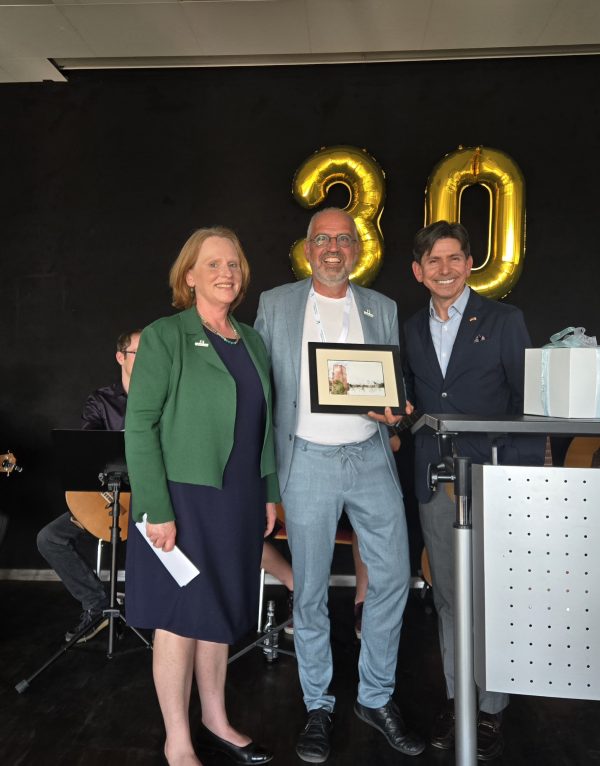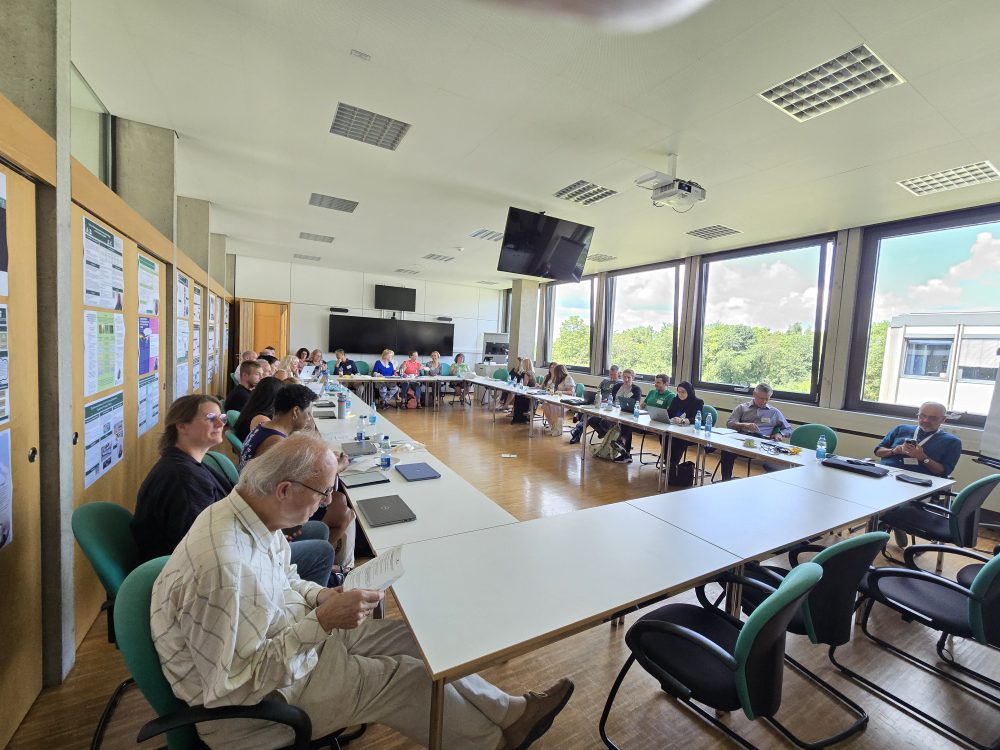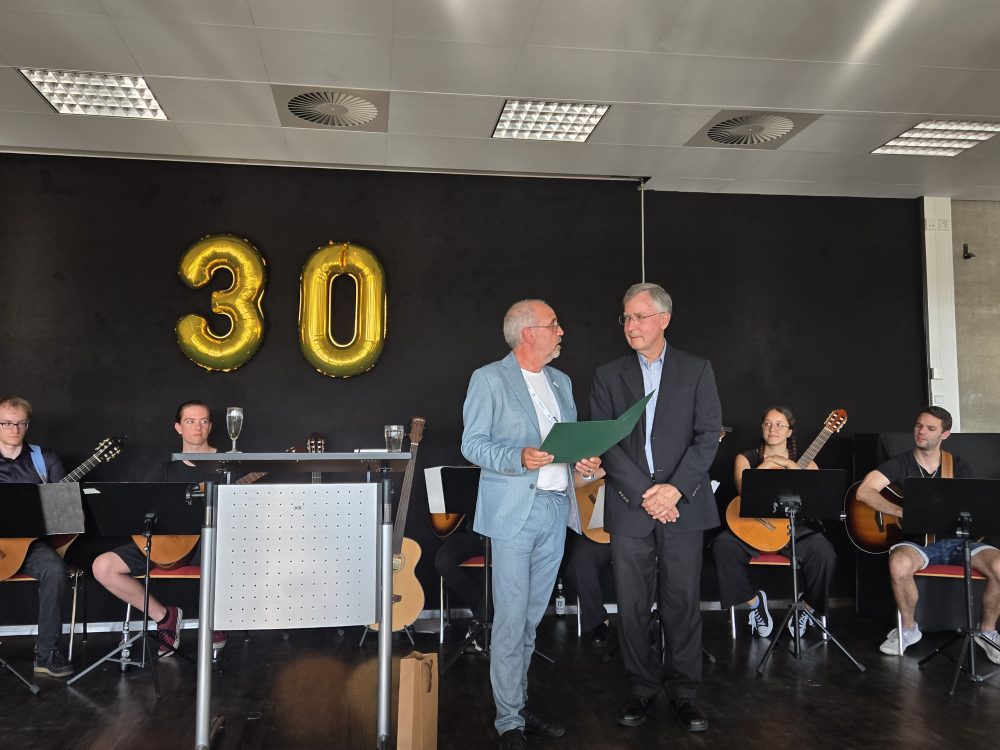German-American Symposium: Unique intercontinental partnership celebrates 30 years of comparative education research

The University of North Carolina at Charlotte and the Pädagogische Hochschule Ludwigsburg have 30 years of history together, deep in the trenches of comparative education research. Originally brought about by the provost of UNC Charlotte and rector of PH Ludwigsburg, the German-American Symposium is now coordinated by Dawson Hancock in the Cato College of Education and Minke Jacobi and Rector Jörg Keßler at PH Ludwigsburg as an opportunity for cross-institutional research. It is steeped in what should be at the heart of any higher education institution: academic discovery and collaboration.
“The Germans do a lot of things similar to us, but their educational system and how they go about implementing it is very different, and there is so much to learn by virtue of comparison,” Hancock says. “All of us tend to look rather myopically and tend to assume that everybody else is doing it the way we are, but what we have demonstrated in spades is that we can learn so much from each other.”
That may sound simple at first read, but it’s created dozens of research partnerships over the years, which have resulted in 63 publications, 80 presentations and likely hundreds of actionable insights for educators on both sides of the pond.
Created by Curiosity
Hancock coordinates with the German team to connect faculty and staff from both institutions who are interested in comparative research, linking interested parties with like minds and letting them run with whatever subject matter they find common ground in. Groups meet virtually throughout the year, then have an opportunity each summer to meet in person, present where they are in their research to their colleagues and fellowship together both in and out of their typical academic setting.
He, too, belongs to a research group, and his path to settling on a line of questioning was not necessarily a traditional one. Hancock’s background is in educational leadership research, but as department chair, he’d been exposed to the Master of School Administration program, which prepares future principals, and wanted to better understand how to support those students and faculty. In Germany, he met Ulrich Müller, a faculty member in adult education who had two children in schools. His role as a parent in the school environment sparked an interest in how principals are selected and trained.
He shared of their meeting, “We met at a symposium, didn’t know each other. But we started talking, brainstorming and found this common interest — what can we do better in the schools to get people into that pivotal role of school principal? I remember, the light came on and both of us said, ‘Yes, I’d love to work with you on that.’”
Since that day, they’ve made 25 presentations and published 22 times together, investigating ways that the two nations’ education systems might learn from each other on how to better recruit, develop and retain principal candidates for their crucial role in school leadership.

While offering himself as an example, Hancock also acknowledged that while this may not seem like a typical way to begin research, it’s not all that uncommon for this particular group of collaborators because it’s less about checking a box and more about the fabric of who they are. “I tell people in our initial conversations when they’re interested in participating: you’re going to have to put some skin in the game, and you’re going to need to make it one of your themes to participate. Don’t just treat this as an add-on, or something extra to do on top of all your other important responsibilities around teaching, research and service. It’s got to become part of it, or it won’t work.”
It’s this insistence that makes these partnerships so fruitful and long lasting — everyone is truly invested.
Expanding Opportunity
In an effort to spread the wealth of opportunity for meaningful partnerships like this, Associate Dean for Graduate Education and Research Scott Kissau created a virtual version of the symposium for doctoral students at both institutions. Using a virtual pinboard software called Padlet, more than 30 doctoral students were able to virtually present their own research and then receive feedback and engage in discussion with faculty and fellow students from both institutions. Kissau also had a chance to share insights from the virtual presentations at the in-person symposium with colleagues.
From this virtual meeting of minds, new collaborations have already been born. Charlotte’s Brandon Watkins and Ludwigsburg’s Anni Lenz connected over their mutual interest in literacy after their presentations appeared next to each other on Padlet. Now, they are making plans to teach a course together in Ludwigsburg soon.
While not part of the charge of the original symposium, this expansion bodes well for the future of the partnership. Hancock shared that it may not ever be feasible financially or logistically for students to join faculty on the annual trips to the other institution, but the power of technology has created new pathways to facilitate research regardless of distance.
30 Years Strong
In celebration of 30 years, this year’s symposium had a few extra bells and whistles. PH Ludwigsburg pulled out all the stops for the event, but much like the symposium itself, it was the people that made it special.
While leaders from both institutions have all attended in the past, it had been a few years since anyone outside Cato College had attended from the Charlotte delegation. This year, Provost Jennifer Troyer joined the trip, commenting, “This is one of UNC Charlotte’s longest-standing international partnerships. It is uncommon for faculty at two institutions to sustain such a deep, cross-cultural collaboration for decades, which speaks to the strength and value of this relationship.”
When asked why Charlotte is so committed to this partnership, Troyer hit the nail on the head. “Living in an international city like Charlotte, we want to prepare future teachers to serve students from many different backgrounds. By engaging in this collaboration, our faculty gain insights from another culture that help them better equip teachers here at home.”
Seventeen presentations were conducted over the course of three days, with nearly every session including members from both institutions. Topics ranged from sustainability to classroom evaluation, from community engagement to artificial intelligence. AI was a particularly popular topic, accounting for about one-third of the presentations, reflecting the way that research must adapt in the face of the changing landscape of education. Troyer noted that these presentations stood out to her, saying, “It highlighted that our countries face many of the same challenges and opportunities, particularly in how students are using AI.”

In addition to the typical program of research presentations, there was a special presentation to be made at the closing reception. Hancock received an honorary doctorate from PH Ludwigsburg, an honor that isn’t given out often by the institution.
Anselm Böhmer, a visiting scholar to Charlotte from Ludwigsburg last semester, delivered the remarks, praising Hancock’s leadership, his commitment to academic discovery and excellence, and his human approach to collaborating with colleagues in both institutions. In closing, Böhmer said, “In you, I see that education not only broadens our minds but also opens our hearts to what truly matters — educating others as well as ourselves!”
When asked what the honor meant to him, Hancock had to pause for a moment. “Well, it takes my breath away to realize that something that I started out doing just because it seemed interesting, quite frankly, emerged into something that was just part of my identity. If you had told me years ago that I’d be doing this now, I couldn’t have imagined it, but it’s sort of come about by accident. It’s a real honor, both the honorary degree and just to be able to serve this way.”